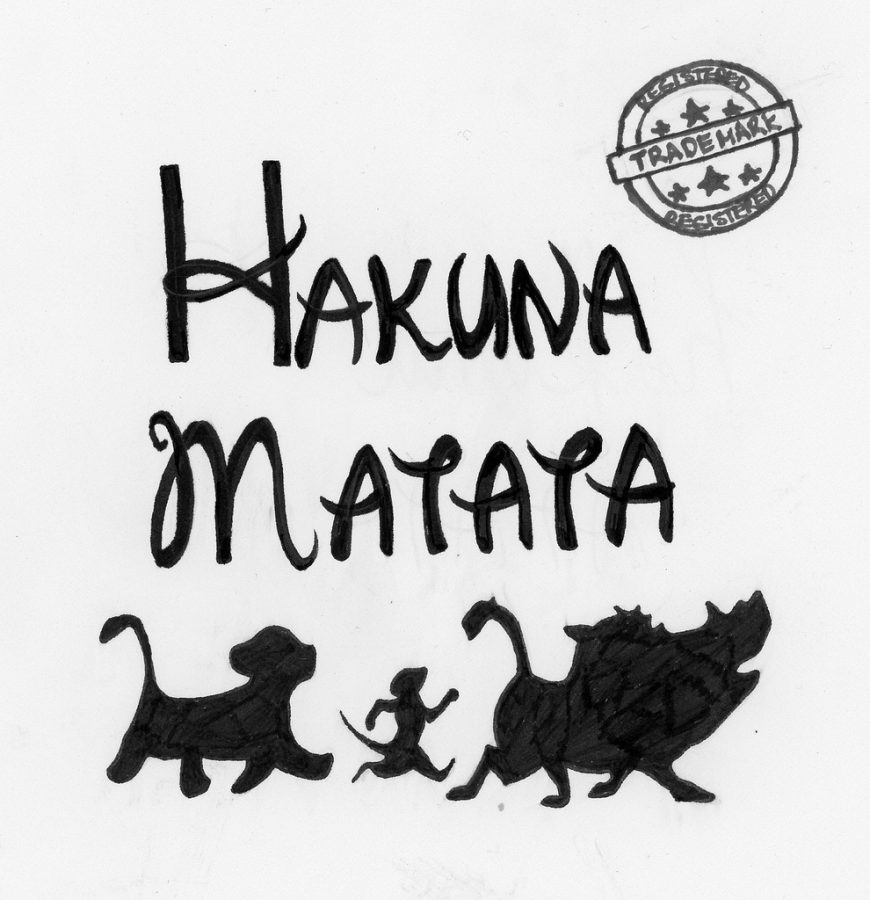Can Disney trademark “Hakuna Matata”?
ILLUSTRATION BY MAI WEBER
February 9, 2019
In the wake of the re-release of Disney’s well known film “The Lion King,” Zimbabwean activist Shelton Mpala calls for Disney to revoke it’s trademark of the Swahili phrase “Hakuna Matata” in a recent online petition.
So one may wonder, is Disney making a wrong move here, trademarking a phrase closely connected to a rich culture, especially considering that Disney didn’t actually coin the phrase? Is this really cultural appropriation? Why does this even matter?
This matters not because Disney is using the phrase, but because Disney is using the phrase for profit. As respected as Disney is, this is something that is hypocritical because it disrespects those in the Swahili culture. It’s putting a phrase sacred to one’s culture on a t-shirt for the sake of profit.
“While we respect Disney as an entertainment institution responsible for creating many of our childhood memories, the decision to trademark ‘Hakuna Matata’ is predicated purely on greed and is an insult not only the spirit of the Swahili people but also, Africa as a whole,” Mr. Mpala stated in his Change.org petition.
One may argue that Disney trademarked the phrase simply because they don’t want others to use the phrase, not necessarily because they want to make money off of it. Although that is a valid point, one must note that the only reason companies trademark phrases is to make money.
According to Legalzoom, trademarked phrases must be intended for commerce. “That means that you must use it to sell some sort of goods or services. You can’t trademark a phrase just because you like it and don’t want anyone else to say it.” Trademarks don’t prevent a person from using the phrase. They prevent the same or similar phrase from being used for profit, and Disney placed their stake on something that’s not theirs.
This is a picture perfect example of cultural appropriation. The Cambridge Dictionary defines cultural appropriation as “the act of taking or using things from a culture that is not your own, especially without showing that you understand or respect this culture.” Cashing in on someone’s culture is not a way to show respect to one’s culture or show a personal understanding.
While making money off-of one’s culture is definitely an example of cultural commodification, Disney’s large platform converts their situation into a case of cultural appropriation. Everything that is trademarked with the phrase “Hakuna Matata” is sold to the public who wear it, unaware of the how they are also part of stealing one’s culture without acknowledging the Swahili culture.
It is also possible to argue that this is an example of political correctness and that it isn’t really harming anyone. Personally, this was my first thought when I found out about this petition, as it all seemed a little random and excessive. A Kenyan entertainment lawyer Liz Lenjo disagrees with the petition. Lenjo told CNN Disney “has not stolen anything and the outrage over the trademark is misplaced…the use of ‘Hakuna Matata’ by Disney does not take away the value of the language.” This is understandable, but this is not what the petition itself is about. Lenjo is right that the use of the phrase does not take away from the value of the language; it’s the trademark on the phrase that takes away the value, the monetary price tag.
Other companies have trademarked phrases, such as how LG trademarked “Life’s Good” and Nike built its company on the phrase “Just Do It.” Trademarks for these companies have proved effective, but it’s not the same as Disney’s actions. These companies came up with their own phrase for profit. Disney stole a cultural phrase without consent to advertise on Lion King merchandise for 25 years. Disney, let alone any company, should not be allowed to claim something they did not invent themselves to make cash, especially since their audience spans millions of viewers.
Maybe the reason this controversy didn’t come out before is because at the time of its original release in 1994, no individual or group felt the need to demand action because the world was not divided like it is in present day.
“At a time when divisiveness has taken over the world, one would think re-releasing a movie that celebrates the unlikely friendships, acceptance, and unity, Disney would make a decision that goes completely against these values,” stated Mpala. The fact that Disney continues to profit in a divided world when the new Lion King movie is coming out is an injustice.
As beloved as Disney is, this serves as a lesson for all; trademarking something from a culture is essentially turning plagiarism into a personal piggy-bank for one’s own benefit at the expense of a group. Simply put, it is clear that trademarking “Hakuna Matata” is just as bad as stealing one’s customs and portraying it as your own; it’s cultural appropriation.



